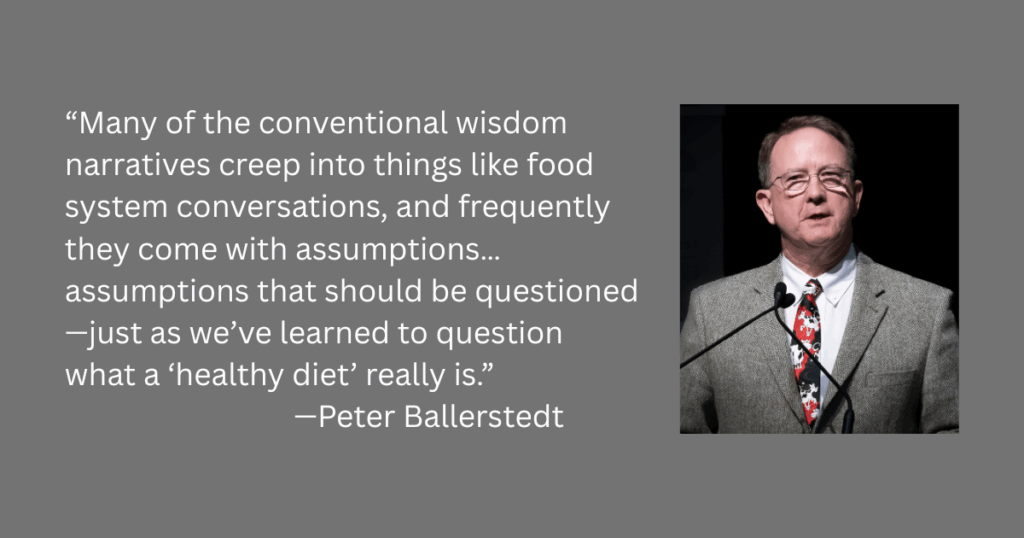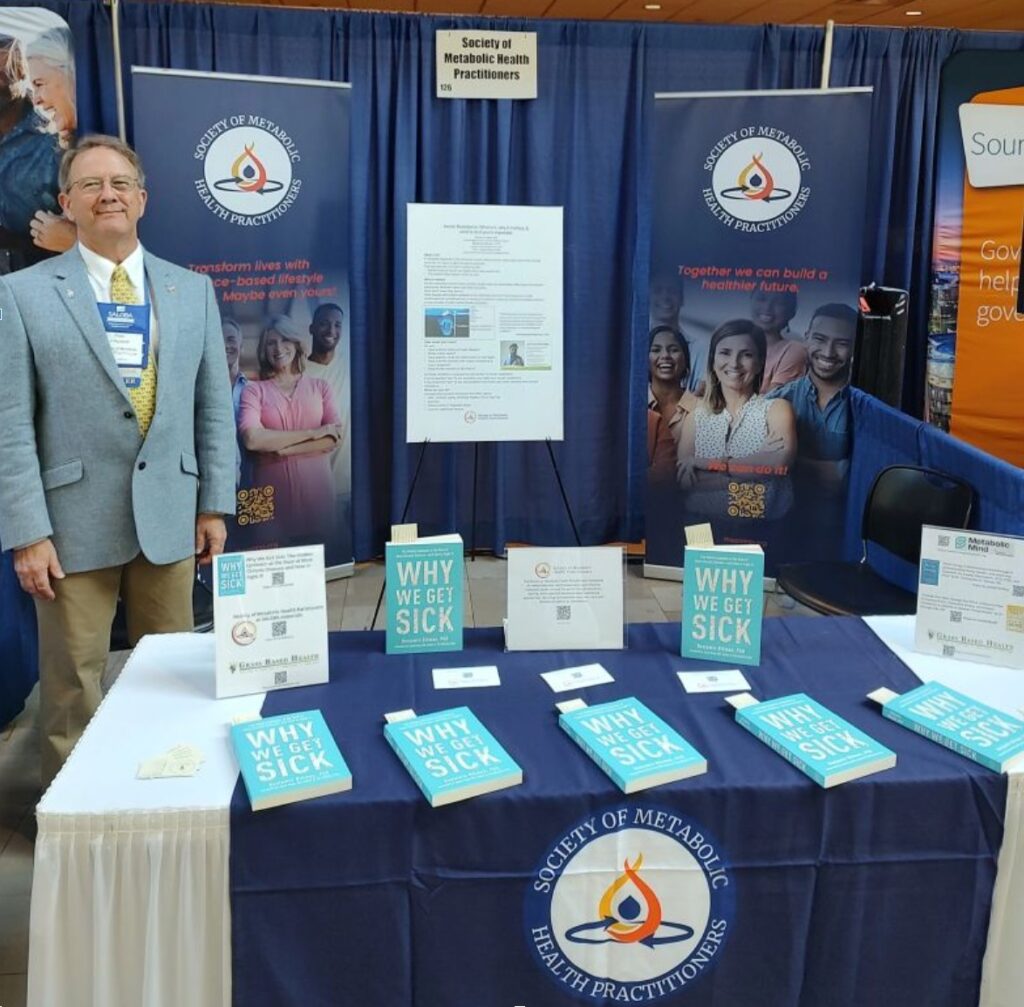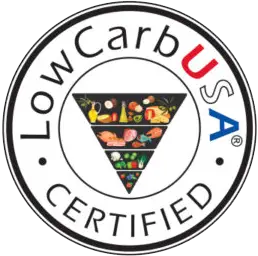Why reversing malnutrition—not emissions—may be the most important global sustainability effort
“If humanity is facing an existential crisis, that existential crisis is malnutrition,” said Dr. Peter Ballerstedt, who returns to the stage this August 14-17 at the 10th Annual San Diego Symposium for Metabolic Health.
His upcoming presentation—titled “Food for Thought: Metabolic Health and ‘Sustainability’”—challenges not only the modern food system, but the very narratives that shape how we think about health, nutrition, and the future of our species.
“Unfortunately, many of the conventional wisdom narratives creep into things like food system conversations,” Ballerstedt explained. “And frequently they come with assumptions… assumptions that should be questioned—just as we’ve learned to question what a ‘healthy diet’ really is.”
His central message is simple but powerful: if we fail to confront malnutrition—not just in the form of famine, but in the form of metabolic dysfunction and chronic illness—then debates over climate, sustainability, and healthcare are missing the deeper issue. “We must have more animal source food in humanity’s diet,” he said. “Improving your own metabolic health may be the most impactful thing any individual can do to address these greater global issues.”

The Sodfather Returns to San Diego
Peter Ballerstedt (aka “The Sodfather”) is more than a passionate advocate—he’s a global voice at the intersection of agriculture and metabolic health. With a Ph.D. in forage management and utilization and a minor in ruminant nutrition, Peter has spent decades working in grassland agriculture and sustainable food production. He is the current President of the American Forage and Grassland Council and a longtime member of several national and international scientific societies.
Peter has been a fixture at this symposium for many years, valued for his ability to cut through jargon and deliver compelling, evidence-based insights. His study of human nutrition, he noted, is fueled by personal experience: “I strive to build bridges between my agricultural tribe and my low-carb, keto, and carnivore tribes.”
Debunking Myths: Protein, Land Use, and the Planet
This year, Peter will tackle a series of widely held but deeply flawed assumptions in food and environmental policy—myths that continue to shape public understanding of nutrition, agriculture, and sustainability.
Among the key issues he plans to address:
- The misconception that all agricultural land could be used to grow crops for direct human consumption. “The vast majority of agricultural land is only or best suited for grassland-type agriculture,” Peter said, “which means grazing animals—primarily ruminants—are the most efficient and sustainable use of that land.”
- The belief that plant and animal proteins are nutritionally equivalent. “Plant source protein and animal source protein are not equivalent, gram for gram,” he said. “The dietary guidelines use ‘ounce equivalents’ that have never been validated in the literature.”
- The narrative that feeding livestock wastes food that could go to people. “There is no feed-food competition when it comes to ruminant animals,” Peter explained. “In fact, the commercial beef industry is a net positive protein contributor to our food supply.”
- The idea that methane emissions from livestock are uniquely harmful. “We have this schizophrenic approach where methane from wildlife is ignored, while methane from livestock in the same environment is demonized,” he said.
He also takes aim at the persistent idea that red meat is a public health hazard. “We still have people who think that red meat is a hazard for cancer or heart disease, and it gets wrapped into this global footprint narrative,” he said. But perhaps his most provocative challenge is this: “What is the environmental burden of the healthcare system treating malnutrition-related chronic illness? By some estimates, it’s in the same realm as global beef production.”
Why Attend the Symposium?
Now in its 10th year, the San Diego Symposium for Metabolic Health is the longest-running annual event of its kind. The conference has consistently delivered a one-of-a-kind experience—not just for the general public, but even more importantly for healthcare professionals, researchers, coaches, and health advocates committed to reversing chronic disease through therapeutic nutrition.
“If you are a healthcare professional, are you satisfied with the current health of your patient population?” Peter asked. “Or do you feel like maybe there’s some additional tools that you could put into your toolkit?”
For non-clinicians, the benefits are just as significant. “Some of us aren’t blessed to live in communities where people are trying to do the same thing,” Peter said. “Finding that kind of support and community is enormously important.”
Unlike most conferences, this event is known for its openness and accessibility. “It’s not like some events where you’ve got the purple rope,” Peter said. “There is interaction between the speakers and the attendees. In many cases, you’ll find the speakers sitting out in the audience because they want to learn, too.”
An SMHP Event | Hosted by LowCarbUSA®
When asked about the Society of Metabolic Health Practitioners (The SMHP)—the organization behind the Symposium for Metabolic Health—Peter Ballerstedt responded with characteristic enthusiasm. “The SMHP is a critical part of the societal transformation that has to take place,” he said. “Having the training, the credibility, and the resources—that’s what helps us scale this movement.”
The Symposium itself is an SMHP event hosted by LowCarbUSA®, a collaboration that reflects the growing reach of the metabolic health community and its commitment to education, connection, and clinical excellence.
Peter has committed himself to being a tireless, dedicated advocate for SMHP and its mission. In recent years, he’s volunteered his time and resources to represent the organization at events far beyond the low-carb space. At agricultural conferences across the country, Peter has set up tables covered in SMHP signage and copies of Why We Get Sick by Dr. Ben Bikman—offering free books, educational resources, and conversation to professionals who may never have encountered this information before.

Peter frequently cites the SMHP’s Clinical Guidelines in his lectures and praised their open-access format: “It’s one of the best summaries of the literature I’ve seen, and it’s freely available.”
He also highlighted the Journal of Metabolic Health, the international practitioner search, and SMHP’s global partnerships. “The SMHP is connecting practitioners and advocates from all over the world, and that’s crucial—because these are global issues, not just problems in high-income countries.”
A Decade of Dedication
Reflecting on the 10-year milestone, Peter offered warm praise for the event’s founders, Doug Reynolds and Pam Devine.
“This is clearly a calling for them,” he said. “They’re not doing this to make vast amounts of money. In fact, they’ve gone into the red on a number of occasions.”
He added, “I’m very grateful for the work they’ve put in, the effort, the investment—literally. I’m honored to count them as friends. They’re certainly herd mates, as far as the ruminati are concerned.”
“We Must”
As the conversation closed, Peter returned to a message that defines not only his presentation but the spirit of the entire event.
“People will say things like, ‘We can’t feed the world the kind of diet that we would recommend.’ And I shift that, and I say—we must. It is our moral obligation to help humanity provide the diet it needs… Because we won’t meet the goals of 2050 if we don’t do that.”
Learn more about the 10th Annual San Diego Symposium for Metabolic Health.

